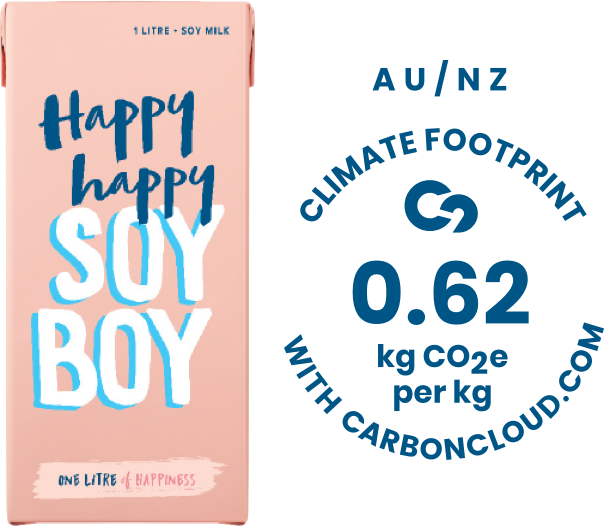

Every choice we make about the food we consume has a climate impact. We have engaged CarbonCloud, a Swedish climate footprint specialist, to calculate the seed to cup life cycle of all of our products.
Read our article on the CarbonCloud website
They have also conducted an analysis of full cream dairy milk (3.8% fat, the Australian industry average).
These figures allow us to compare the climate impact of each product per kg. This comparison clearly highlights the environmental efficiency of plant based products over dairy.
Climate change is the greatest challenge of our generation, and we need to be able to make these considerations with every product we choose to buy and consume.


Happy Happy Foods Pte Ltd engaged CarbonCloud, a global leader in environmental footprinting, to undertake a comprehensive study to determine the carbon footprint of all of our products. All available relevant data has been provided to Carbon Cloud to undertake its calculations for our products. We believe that CarbonCloud has taken all reasonable steps to ensure the accuracy of these calculations.
CarbonCloud has independently obtained data and calculated the footprint of dairy milk products around the world, including Australian 3.8% fat dairy milk (the Australian average, as stated by Dairy Australia*) . CarbonCloud’s methodologies are underpinned by the specifies principles, requirements and guidelines for the quantification and reporting of the carbon footprint of a product as outlined in ISO 14067 (https://www.iso.org/standard/71206.html) and the GHG Protocol Product Life Cycle Accounting and Reporting Standard (https://ghgprotocol.org/).
The climate footprints printed should be interpreted as a guide to the expected carbon emissions of each product. As production, processing, packaging and transport scenarios are variable, these numbers are subject to change and variation.
Happy Happy Foods Pte Ltd, and its subsidiaries, take no responsibility for the accuracy of climate footprints supplied by CarbonCloud.
*Information correct as of date of publication, 18/01/23